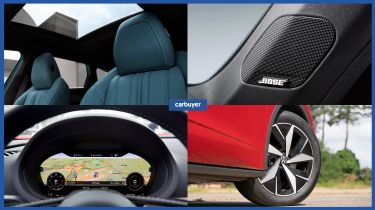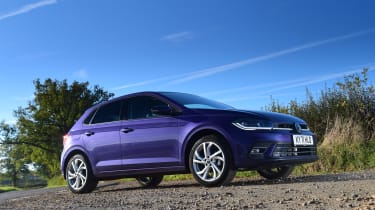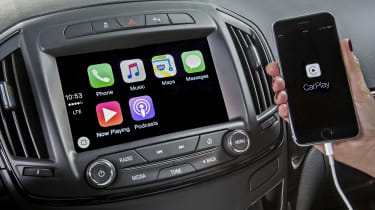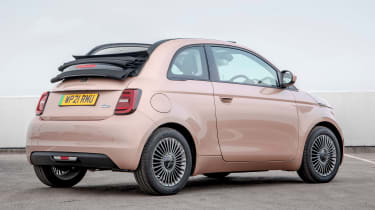Car options: availability and which ones to pick
Knowing what options to select and which to avoid can be tricky – we help you make the right decision

Choosing the right car is a big decision for anyone, but the calls you make on the options list can be almost as complex. Configuring your new car isn’t just about what you want in a car – it pays to think about residual values as well. Leather seats in a supermini are an expensive option, yet will recoup only a fraction of their cost on resale.
Conversely, fail to add sat nav to your executive saloon and you may find it’s worth less when you trade it in. We’re not suggesting you ignore your own preferences and buy a new car purely as a commodity, but it’s sensible to think carefully about what options to go for. Also remember, if adding an optional extra tips a car's price over the £40,000 threshold, the car will be liable for a hefty road tax surcharge in years two to six of ownership.
To add insult to injury, global semiconductor shortages have complicated matters even further; issues with sourcing high-tech materials for production have meant that some popular options are now no longer available, whereas others are more expensive or may incur massive delays on your lead time.
In this article, we’ll strip away all the unnecessary jargon and explain what exactly car options are and which boxes you should be ticking when making your next car purchase. We’ll also break down what effect the ongoing chip shortage has had on supply and what types of features you can expect to be unavailable.
Trim levels vs options - what’s the difference?

Usually the first thing you’ll be confronted with when specifying your new car is a list of several different trim levels. These are essentially different versions of the car in question, each with different (and usually ascending) levels of standard equipment. For example, Volkswagen offers the Volkswagen Polo in four different trim levels: Life, Style, R-Line and GTI. The mid-spec Style offers visual and equipment upgrades over the standard Life car, such as Matrix LED headlights and larger alloy wheels. For those wanting to standard out, the R-Line brings several sporty styling tweaks including more aggressive bumpers, as well as figure-hugging sport seats and model-specific badging so other motorists will be sure which version you picked.
Options act as an extension of trim levels; these usually come in the form of individually priced items and features that are not included in the standard list of equipment on your chosen trim level. For example, buyers can add a reversing camera and parking sensors to an entry-level Skoda Karoq SE Drive for around £700. However, it is worth noting in this case that stepping up to the next trim level will only cost around £2,000; the mid-spec SE L model includes the aforementioned reversing camera and sensors, plus even more features like larger alloys, keyless entry, upgraded upholstery and heated seats. Therefore, it is always worth checking the next trim level up from your current specification to ensure you’re getting the best value-for-money. Our in-depth reviews will help you here, or you can use a manufacturer’s website or speak to one of their salespeople for advice.
Option packs
After selecting your chosen trim level, you may be presented with a variety of option packs. These combine several individual options into one easy-to-understand package and come with their own benefits and drawbacks.
At face value, the majority of option packs allow you to save money versus specifying several options individually. For example, a larger infotainment touchscreen may cost £1,000 and an upgraded stereo could cost £800. An option pack containing both features could theoretically set you back just £1,500, saving you a significant amount of cash, while potentially throwing in other features for free such as wireless phone charging.
However, manufacturers have found a way to manipulate buyers and simplify manufacturing by restricting certain features to wider equipment packages, meaning that you cannot specify a single piece of kit without forking out extra for an entire equipment pack. This may result in buyers spending more for features and gizmos that they would otherwise pass on, ultimately making the manufacturer more money. In this case we would seriously consider whether you really need that one specific feature in a package, as this can sometimes only represent a small percentage of the total value of what you’d be paying.
The best new car options

As mentioned earlier, choosing new car options wisely requires a combination of thinking about your needs as well as residual values. Generally speaking, small cars come with cloth seats and manual gearboxes, while larger executive cars have automatic gearboxes and leather trim. Air-conditioning is thought of as an essential, and metallic paint is more frequently ordered than not.
Looking at what second-hand models of your car are worth on used-car websites can be invaluable. Is there a vast price difference between diesel and petrol engines? Do the majority of cars have satellite navigation? Ultimately, you’re the one choosing the car, so if you find leather seats uncomfortably hot in the summer, go for cloth – just be prepared for the car to be worth a little less in a few years’ time if this is an unusual specification.
When it comes to other options, try to think about what you’ll use frequently. Many once considered parking sensors a luxury, but they’re now seen as a near-essential. While we’d typically steer clear of finicky self-parking systems, a reversing camera is another invaluable asset that makes parking safer and easier.
One option definitely worth considering is Apple CarPlay and Android Auto functionality. This allows you to connect your phone to the infotainment system – either wirelessly or via a USB cable – and run a modified version of your device’s built-in software. This negates the need for built-in sat-navs as you can use whatever navigation app you have installed on your phone. The benefits don’t stop there, however, as you will also be able to make calls, reply to texts (using voice recognition), play music and even access your calendar all from your car’s central screen.
All-in-all, try not to get too bogged down in decisions, but keep in mind the practical applications of options and how you use your car on a day-to-day basis. One we’d always go for if possible is a full-sized spare wheel, as it’s much less likely to let you down than the puncture repair kits most cars come with these days.
New car options to avoid

The variety of options available when buying a new car has increased significantly over the years, but there are still some adages that hold true. As mentioned above, you won’t recoup the cost of leather seats if you order them in a small car such as a Ford Fiesta or Volkswagen Polo, yet fail to add leather when specifying your BMW 5 Series and you may be penalised when you sell it or trade it in. Happily, a lot of executive cars and SUVs now come with leather (or a synthetic equivalent) as standard.
Outside of the rarefied world of supercars, unusual colours make cars less appealing to buyers. A silver Ford Focus will almost always be easier to sell and be worth more than a yellow one on the second-hand market. Some small cars, such as the MINI and Fiat 500, make a point of being highly customisable and offer a host of small detail options, such as interior trim colour flashes and roof colours, allowing buyers to create cars that are almost unique to them. This is wonderful for those after variety and choice, but get it wrong and you could be left with a highly individual car that doesn’t appeal to the majority of buyers and is therefore difficult to sell.
Another thing to consider is that some optional extras do come with inherent disadvantages, apart from leaving you out of pocket. For example, a panoramic sunroof may flood the interior with light, but it usually comes at the cost of rear headroom. Keyless entry can bring a vulnerability to keyless car theft, larger wheels can impact ride quality, and while LED headlights are intended to last the life of the car, they can be much more expensive to repair and replace than their halogen counterparts if they go wrong.
Car option availability
It's one thing to know which features you want in your new car and another to know whether they are currently available. Global semiconductor shortages mean that several options and features (usually the most tech-focused items) are temporarily unavailable on a large portion of new cars.
A good example of this is the ‘digital dash’ that was introduced as part of the 2021 refresh of the MINI hatchback. Once exclusive to the MINI Electric, this modernises the car’s interior while maintaining the brand’s unique retro charm. Unfortunately, the digital dash is currently unavailable to specify for the majority of the MINI range, only being fitted to Electric and sporty John Cooper Works cars.
It’s worth checking with your dealer whether your desired features are currently available; and if not, asking if/when they may be coming back. If a piece of kit that you wanted isn’t available, you might be able to ask for a discount to help sweeten the deal. Alternatively, it’s worth checking if the item can be retro-fitted at the dealership when it does become available.
Some manufacturers, including motoring giant Ford, are offering models at a lower price if customers are prepared to forgo some equipment. This includes a Design version of the Ford Puma that uses fewer chips at a reduced price.
Although it’s rare, we have heard reports of people ordering a new car, only to take delivery of their new pride-and-joy and finding it doesn’t have all of the equipment they expected. As is always the case with buying a new car: make sure to ask and do your research before you buy!
Looking to keep running costs as low as possible? Check out our list of the top 10 best road tax-free cars
Most Popular

New Smart #5 Brabus is a 637bhp far cry from the brand’s city car past

Best car leasing deals 2025: this week’s top PCH offers
Tips & advice

Car dashboard warning lights: what does each symbol mean?

Electric car charging stations: public networks, charger types, apps and maps








